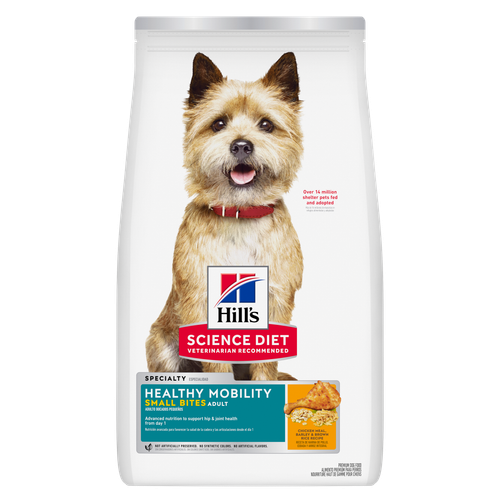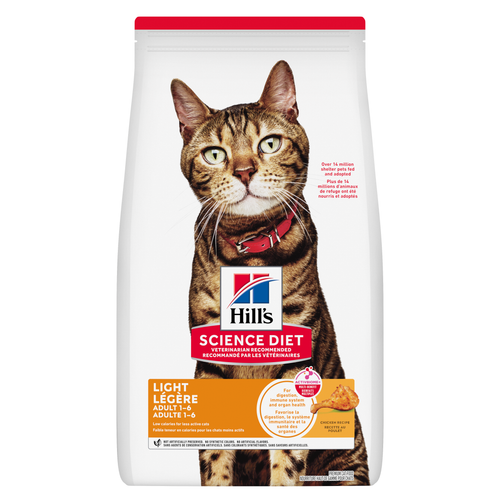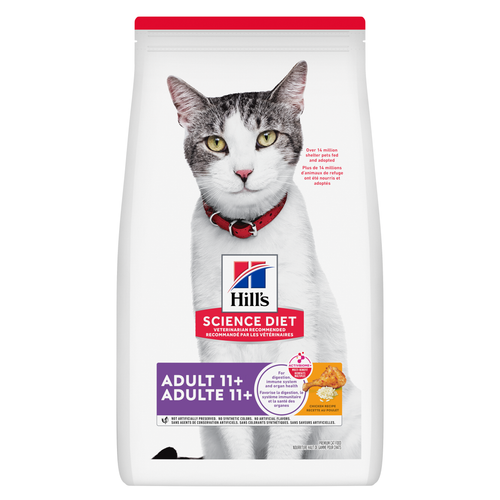
-
Find the right food for your petTake this quiz to see which food may be the best for your furry friend.Find the right food for your petTake this quiz to see which food may be the best for your furry friend.Featured products
 Adult Healthy Mobility Small Bites Chicken Meal, Barley & Brown Rice Recipe Dog Food
Adult Healthy Mobility Small Bites Chicken Meal, Barley & Brown Rice Recipe Dog FoodAdvanced nutrition to support hip & joint health from day 1
Shop Now Adult Sensitive Stomach & Skin Small & Mini Chicken Recipe Dog Food
Adult Sensitive Stomach & Skin Small & Mini Chicken Recipe Dog FoodHill's Science Diet Sensitive Stomach & Skin Small & Mini dry dog food is tailored nutrition for Small & Mini dogs while being gentle on stomachs. Nourishes skin & promotes a lustrous coat.
Shop Now Adult Light Large Breed Chicken Meal & Barley Recipe Dog Food
Adult Light Large Breed Chicken Meal & Barley Recipe Dog Food18% lower calories vs. Science Diet Large Breed Adult
Shop NowFeatured products Adult Light Chicken Recipe Cat Food
Adult Light Chicken Recipe Cat Food20% lower calories vs. Hill's Science Diet Adult
Shop Now Adult Healthy Cuisine Seared Tuna & Carrot Medley Cat Food
Adult Healthy Cuisine Seared Tuna & Carrot Medley Cat FoodDelicious seared tuna paired with tender carrots in a mouthwatering sauce
Shop Now Adult 11+ Chicken Recipe Cat Food
Adult 11+ Chicken Recipe Cat FoodSupports brain health & beautiful fur. Helps keep immune system, heart & kidneys healthy.
Shop Now -
Dog
- Dog Tips & Articles
-
Health Category
- Weight
- Food & Environmental Sensitivities
- Urinary
- Digestive
- Joint
- Kidney
- Dental
- Cancer
-
Life Stage
- Puppy Nutrition
- Adult Nutrition
- Senior Nutrition
Cat- Cat Tips & Articles
-
Health Category
- Weight
- Skin & Food Sensitivities
- Urinary
- Digestive
- Kidney
- Dental
- Stress
- Cancer
-
Life Stage
- Kitten Nutrition
- Adult Nutrition
Featured articles Antioxidants
AntioxidantsUnderstand the importance of antioxidants in your dog or cat's food, and how they can help protect your pet and keep them healthy.
Read More Water
WaterDiscover why water is the most important nutrient for your dog or cat to live a healthy life. Find out how much water your pet should consume each day.
Read More Importance of DHA in your Pet's Food
Importance of DHA in your Pet's FoodLearn about DHA, Docosahexaenoic Acid, a natural omega-3 fatty acid that is essential in the development of the brain and nervous system in cats & dogs.
Read More -


"Is my cat overweight?" You might be asking that question after noticing your beloved Fluffy is looking a little, well, fluffy. Weight gain is a common issue with cats, especially as they get older and their metabolism slows down. In fact, the Association for Pet Obesity Prevention estimates that nearly 60 percent of cats in the United States are overweight. Excess weight can cause and exacerbate health problems in your cat, so it's important to be able to recognize when your kitty is getting chubby so that you can take steps to reduce the impact on her health. Keep reading to learn how to tell if your cat is overweight.
Is My Cat Overweight?

One method to tell if your cat is overweight is to feel along her rib cage. For a healthy cat, the padding shouldn't feel any thicker than the padding over the back of your hand, says the Cummings Veterinary Medical Center at Tufts University. If you have to press firmly in order to feel her ribs, then she may be overweight. If you can't feel her ribs at all, then your kitty may actually be obese.
Another way to tell is to use the 1-5 body condition score. Stand over and look down at your cat while she's standing. If she's a healthy weight, you should see a slight indentation over the hips that resembles a waist, although this might be hard to see if your kitty has long hair. If her sides bulge out instead, then your cat may be on the tubby side. If you try these methods and you're still wondering, "Is my cat overweight?" then you should take her to see your veterinarian, who can weigh her and examine her overall body condition. Asking her doctor is the most reliable way to ascertain whether your cat needs to lose weight.
How Excess Weight Impacts Your Cat
Being overweight has a psychological effect on humans, and it's no different with cats. While cats don't spend time looking in the mirror wishing they could look better in a bathing suit, overweight cats might refrain from engaging in normal cat activities like play and personal hygiene. This can not only lead to skin problems and possible urinary tract infections, warns Catster, it can also be a sign your kitty is feeling depressed or anxious. A study in the Journal of Veterinary Behavior reported by The Telegraph concludes that cats and dogs can sometimes overeat to combat stress or negative feelings. Not only that, but overweight cats are also more prone to diseases, such as diabetes, arthritis, and joint pain, the Cummings Center points out. The Cummings Center also notes that excess weight can cause chronic inflammation, a condition that negatively impacts the overall health of pets in ways vets and pet parents are only beginning to discover.
Causes of Cat Weight Gain
The most common causes of cat weight gain are overfeeding and not enough exercise, says Wag!. This sometimes happens without pet parents realizing it, especially as cats get older and their metabolisms and their activity levels slow down. An older cat has different nutritional needs than when she was younger, and continuing to feed her the same amount and type of food you always have once she reaches middle age is a recipe for weight gain. This is another reason why it's a good idea to visit your vet if you notice that your cat has gained weight.
Cats at Risk of Gaining Weight
Some cats are at higher risk of becoming overweight or obese, says the Cummings Center. Neutered male cats have the highest likelihood of becoming overweight. Indoor cats are at risk, as are cats who are less active for other reasons. Cats who are free-choice fed — that is, allowed to graze on a bowl of kibble throughout the day — are also more likely to be overweight.


Tasty Tips
How to Help Your Kitty Lose Weight

Recognizing that your cat is overweight is only half the battle. Here are some steps you can take to return your kitty to a healthy weight.
Take Your Cat to the Vet
Your vet should see your kitty to either identify or rule out any underlying health issues that could be causing her weight gain. Once disease is ruled out, your vet can provide you with guidelines for how much your cat should weigh and a healthy meal plan to help her get back to her healthy weight.
Control Her Food Intake
While it might seem like a good idea to drastically cut back on the amount of food you give your overweight cat, doing so could actually be dangerous to her health. Pet Health Network® writes that for a fat cat, not eating for even two to three days, whether from stress, starvation, or refusal to eat a new food, can lead to a serious form of liver disease. It's safer to help your pet lose weight gradually by feeding her a nutritious weight control cat food formula. If she's very obese, your vet might recommend a therapeutic weight loss food that requires a prescription. At any rate, it's best to discuss your cat's needs with your vet before placing her on any kind of weight loss regimen. Always transition gradually to get her used to a new kind of cat food.
Increase Her Activity Level
It's not always easy to get cats to exercise. After all, you can't simply take her for a walk like you can with a dog. The good news is that cats don't need a great deal of exercise in order to stay healthy, although the amount varies according to the cat's age and breed. Cat Behavior Associates suggests aiming for two fifteen-minute sessions per day of interactive play with your kitty, engaging her in activities like chasing and leaping after her favorite toy. It's a good idea to invest in an indoor cat tree to provide her with opportunities to jump and climb. Combining play time with a cat tree is basically the equivalent of providing your kitty with a home gym.
If you've ever asked yourself, "Is my cat overweight?' you've taken a big step in the right direction toward managing your pet's health. The simple fact that you're not turning a blind eye to your kitty's growing size shows how much you care. Taking action to halt and reverse your cat's weight gain will not only improve her quality of life, but also help to ensure she'll be around to cuddle with you for a long time.


Jean Marie Bauhaus is a pet parent, pet blogger, and novelist from Tulsa, Oklahoma, where she usually writes under the supervision of a lapful of fur babies.
Related products

Delicious seared tuna paired with tender carrots in a mouthwatering sauce

Supports brain health & beautiful fur. Helps keep immune system, heart & kidneys healthy.

20% lower calories vs. Hill's Science Diet Adult

With delicious chunks in a decadent gravy
Related articles

Discover the benefits of Hill's line of kitten foods and how they provide complete and balance nutrition for growing kittens.

When you adopt a cat, you don't just gain a best friend; you also save her life. Here's why getting a cat from a local animal shelter makes so much sense.

Discover how to train your cat, starting with very basic first steps that both reward good behavior and discourage the bad.

Cats are naturally very clean and chances are your kitten will already have learned how to use the litter box from her mother before she comes to live with you.

Put your cat on a diet without them knowing
Our low calorie formula helps you control your cat's weight. It's packed with high-quality protein for building lean muscles, and made with purposeful ingredients for a flavorful, nutritious meal. Clinically proven antioxidants, Vitamin C+E, help promote a healthy immune system.
Put your cat on a diet without them knowing
Our low calorie formula helps you control your cat's weight. It's packed with high-quality protein for building lean muscles, and made with purposeful ingredients for a flavorful, nutritious meal. Clinically proven antioxidants, Vitamin C+E, help promote a healthy immune system.

